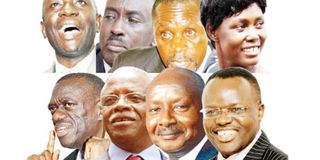US says Uganda’s electoral environment deteriorating

Clockwise: Joseph Mabirizi, Benon Biraaro, Abed Bwanika, Maureen Kyalya, Venansius Baryamureeba, Yoweri Museveni, Amama Mbabazi and Kizza Besigye, are the eight candidates vying for Uganda's presidential seat.
KAMPALA
As eight presidential candidates race towards this year’s Uganda’s February 18 elections, the United States (US) has said Uganda’s electoral environment is “deteriorating”.
The US points to reports about the Uganda Police “using excessive force” as well as the obstruction and dispersal of the political Opposition’s campaign rallies.
Through a January 15 press statement, US Department of State Bureau of Public Affairs spokesperson John Kirby also points to the intimidation and arrest of journalists.
These cases, he said, have contributed to a climate of fear and intimidation, and raise questions about the fairness of Uganda’s electoral process.
“Free and fair elections depend on all Ugandans being able to exercise their right to assemble peacefully, express their opinions, and participate in the electoral process free from intimidation and abuse,” Mr Kirby said.
“They also depend on government institutions and security forces remaining neutral, defending the rights of all people and protecting all parties equally.”
Mr Kirby’s remarks come on the heels of a Human Rights Watch report, which indicts the police for intimidating the public’s watchdog – the media.
When contacted to respond the Mr Kirby’s statement, the Deputy spokesperson of police Polly Namaye said police act within the Uganda’s laws.
These include the Constitution, the Presidential Elections Act, the Public Order Management Act and the Electoral Commission (EC) election guidelines.
She said some candidates campaign well past 6pm, which contravenes the EC guidelines.
In other cases, she said, the candidates hold mini–rallies in places where they never informed the EC they would be.
“In case there is a failure to comply with the laws, there is engagement with the candidates but not necessarily violent engagement,” Ms Namaye told the Daily Monitor on Monday.
“If the candidates are well–versed with the law, they should know it is the work of the police to protect property and life.”
EC spokesperson Jotham Taremwa later told this newspaper the electoral environment is safe.
“All indications are that the electoral environment is secure and safe for all stakeholders to participate freely in the upcoming elections,” Mr Taremwa said.
“We are working with the police to ensure the electoral environment remains and will be conducive for free, fair, and transparent, come 18 February and beyond.”
Recent cases
January 9 – Police in Moroto in the northeast attacked journalists who were trailing Dr Besigye during his campaign in the region. Police accused the journalists of recording images of a roadblock they (police) had placed in Besigye’s way
January 6 – Police in Bukwo District in eastern Uganda block Besigye from visiting an Internally Displaced Persons Camp in the district. They argued it was not in his campaign schedule.
January 5 – Police in Kaboong in the northeast block Mr Mbabazi from appearing on Voice of Karamoja radio station. No substantive reason was given.
November 30 – Police in Kampala block the Lord Mayor Eriasi Lukwago from campaigning in Nakasero Market. They said his entourage would cause traffic jam in downtown Kampala
September – Police in Jinja block Mbabazi from travelling from Kampala to Mbale for a consultative meeting. Police claimed Mr Mbabazi was going to campaign, not to hold a consultative meeting. The EC was yet to officially flag off the campaigns.


